Weight loss is not easy.
That’s obvious.
However, many have successfully lost large amounts of weight and kept it off long term.
These 10 people have shared what weight loss strategies had the biggest impact for them, and how you can use them too.
Their weight loss before and after photos are inspirational, as is their practical advice. Let’s hear from them now…
Trish – Down 115 lbs (52 kg) so far
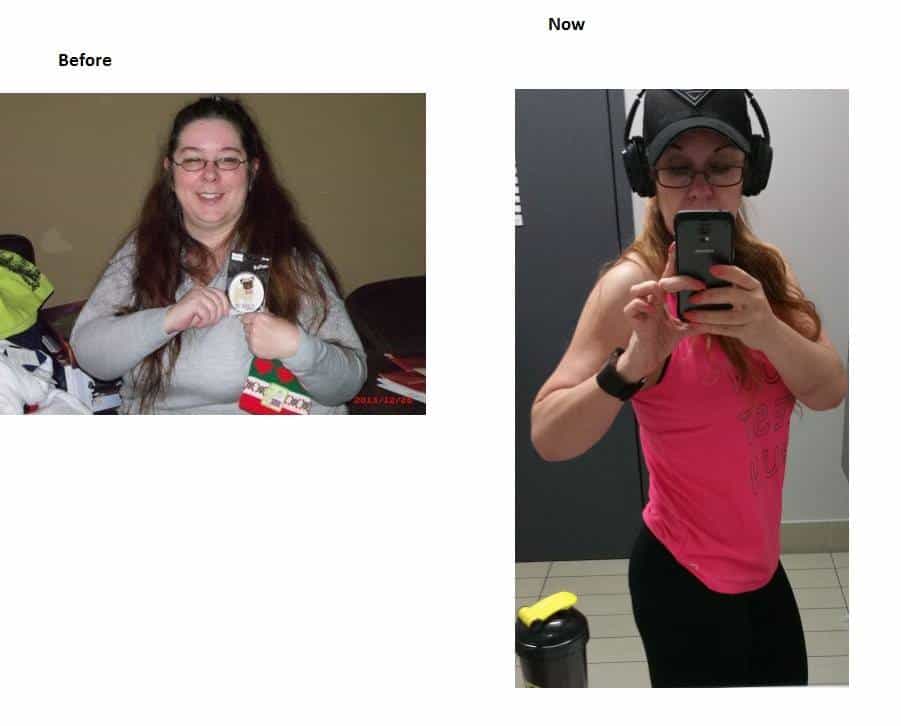
“Weight loss is more than one thing.
But if I had to pick just one it would be to be aware of what I was putting in my body.
Specifically, I started slowly with changing my portions and tracking what I ate.”
How did you track calories when you started out?
“I started with the Fitbit and tracked everything there but then moved to My Fitness Pal as it had a bit more of a database at that time.
I’ve added light exercise too so now I’m watching more macronutrients (the ratio of carbs, fats and protein) to ensure I get enough protein as I lift weights and my muscles need that protein.
I’m down 115 lbs now and my body composition has really changed just in the last year with the weight training.
I still track calories and macro’s and will keep doing so to keep me on plan.”
Joe’s Comment
The number one most under-utilized weight loss strategy would have to be measuring and tracking calorie intake.
Not forever, just for a week or two, especially if you are just starting out and clueless on the calorie-density of the foods you eat.
There’s a good chance you know roughly how many calories you should eat in a day. The average woman only needs 2000 calories, average man is 2500 (1).
But can you confidently say how many calories you usually eat:
- On a weekday?
- On a weekend?
- In a whole week?
If you don’t know how many calories you already eat, you don’t know what to aim for, nor what foods should be modified or cut out.
If this is you, use an online calorie counter like My Fitness Pal or CalorieKing to track your calorie intake for a few days. As Trish said, it’s fundamental you’re aware of what you’re putting in your body.
Jill – Down 120 lbs (55 kg) for five years
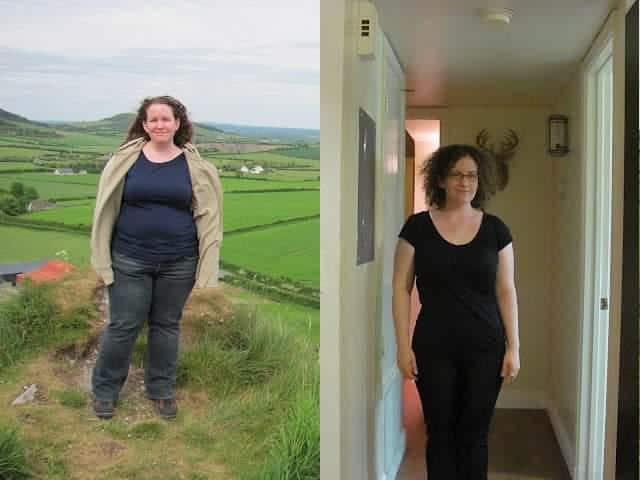
“My weight had been up and down my entire adult life.
I finally realized that if I couldn’t live the rest of my life on the diet that lost me the weight, it was going to creep back on.
So I quit dieting. I eat what sounds good when I’m hungry and I don’t eat anything else at any other time (unless it’s cake).
Listening to my body has led to an increase in vegetable intake and a reduction in alcohol, both of which have helped me feel better and maintain my weight loss.”
What was the motivator or trigger for you?
“I quit dieting when I was in the waiting area at the dentist’s office.
I picked up a years-old issue of Glamour or Cosmopolitan, I don’t remember which. One of the articles was about signs you might be in an unhealthy relationship.
That’s when I realized every diet I had tried was an unhealthy relationship, and that was it for me.”
Joe’s Comment
The weight loss industry will relentlessly try to sell you their diet, supplement or “miracle” solution, but Jill speaks the truth…
Research convincingly shows there is no one superior diet for weight loss. In fact, the most useful weight loss diet or eating pattern is the one you can stick to.
“… if I couldn’t live the rest of my life on the diet that lost me the weight, it was going to creep back on. So I quit dieting.”
Joanne – Down 124 lbs (56 kg) for over ten years
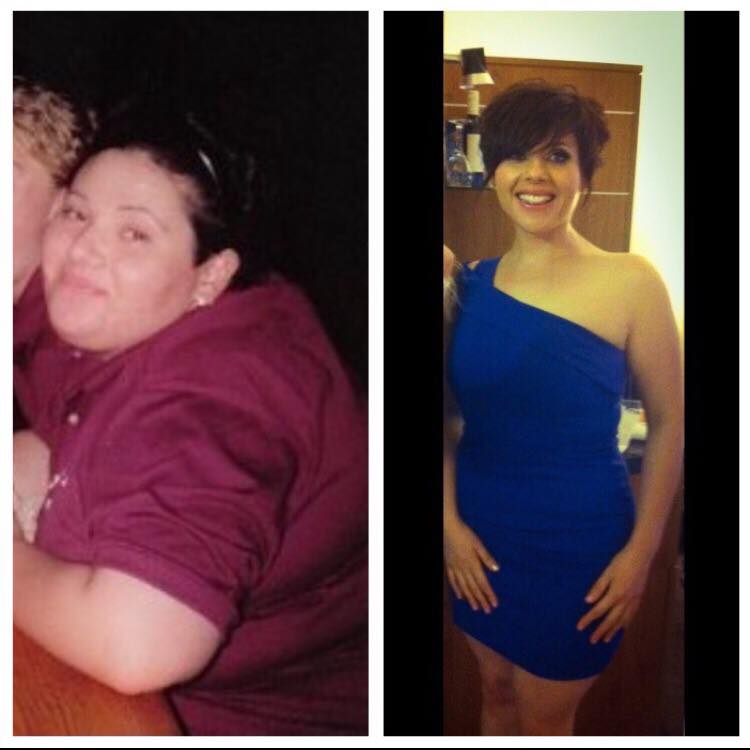
“Being consistent was the biggest factor.
What I did for weight loss became what I do for long term health. When you live it long enough and it becomes how you live.
For me 90% of what I eat keeps me healthy and 10% keeps me human. I also value sleep, learnt ways to manage stress and found exercise that I enjoy.
In fact, if weight ever starts to creep up, it’s usually because one of the above is out of whack.
I also recommend keeping a food diary and documenting your emotions on that day. You will start to pick up behaviours that affect you food choices. You also notice patterns so you can start to think of ways to deal with those situations with non-food responses.
And never say I can’t have that. Change your language to I choose not to have that, which means you are the one in control.
And if you eat something that perhaps wasn’t the healthiest choice, write it in your journal and simply go back to normal eating the following meal.”
Joe’s Comment
Again, a positive mindset shift for Joanne was so powerful.
She also re-emphasizes how useful it can be to document what and how you eat.
Not only is it useful to track calories, but it can also help you identify emotional eating patterns that might be your undoing.
I strongly recommended you track food intake consistently, at least just for one single week.
“Never say I can’t have that. Change your language to “I choose not to have that, which means you are the one in control.”
Melanie – Down 50 lbs (23 kg) for a few years now
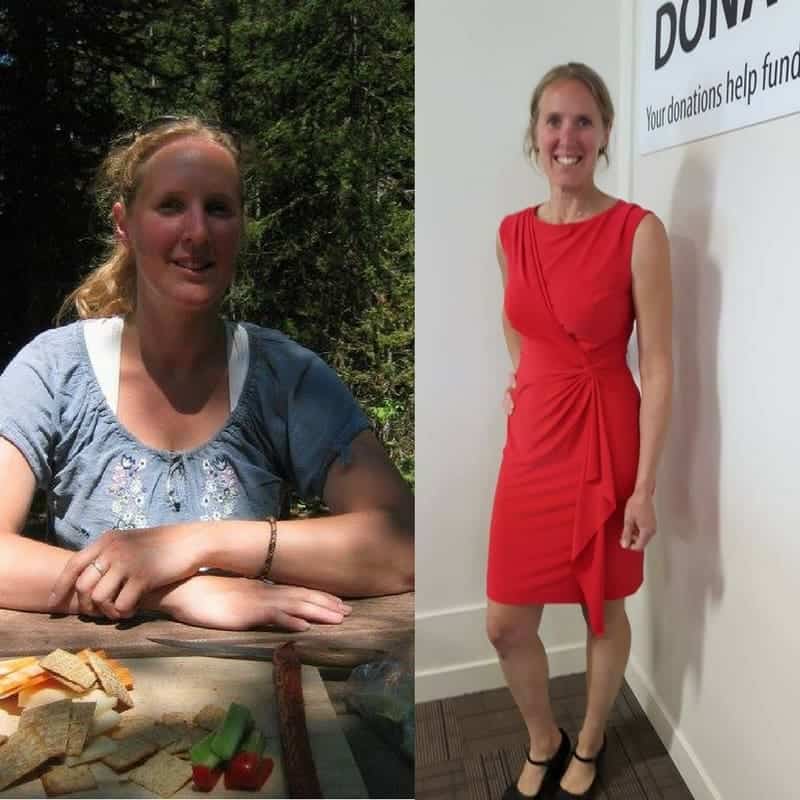
“The first 20 came off easy with calorie restriction (smaller portions) and sport.
I still let myself indulge in whatever I want once in a while and have a good acceptance that I gain 5 to 10 pounds during the winter.”
Joe’s Comment
Melanie has the fundamentals in place to achieve her goal weight and keep it off- reduced calorie intake and increased activity levels.
But the real secret to her success is her attitude towards self-acceptance.
She let’s herself indulge in cravings occasionally and accepts that she will gain a bit of weight during winter. In fact, the majority of people gain weight during the winter, which is the holiday season in the Northern hemisphere (2).
By acknowledging that her weight gain is seasonal, she allows herself permission to enjoy that time of year and to not feel guilty about food choices.
Adopting this mindset helps you maintain a positive relationship with food and prevents you from becoming discouraged or feeling like you failed.
Sarah – Lost 50 lbs (23 kg) six years ago and kept it off

“Biggest change?
Focusing on nutrition, whole foods (cooked and raw) and cooking from scratch rather than eating processed foods.
It gets me excited about what I eat.
To elaborate, although I cut calories and increased exercise to lose the weight, I have not considered calories since.
I focus on reasonable portions and only eating until I’m full. I try to nourish my body by eating as many whole, unprocessed foods as possible as well as cooking from scratch.
I haven’t eliminated dairy, bread/gluten or alcohol but I am careful with them and try to eat mostly fruit, vegetables, meat, and things like quinoa and chia.
I eat plenty of fat but try to get most of it through fish, eggs, nut butters, nuts, avocados and olive/avocado oils. I limit added sugars too.
I keep physically active and try to make small changes like walking for a few minutes every hour while I’m at work or parking farther away from a building than I actually need to. I hike and do yoga regularly because I’m a fiend about getting outside even though I don’t love the gym.”
How did you keep motivated doing all those changes and activities?
“Keeping motivated isn’t too difficult if you’re having fun and not chronically forcing yourself to do things you hate.
Tiny, bland, low-fat, low-calorie meals were the definition of torture for me and although they helped me to drop weight quickly, I wouldn’t have kept ingesting that crap for long.
I LIKE the foods I eat, I love to eat food, and I eat plenty of it. I figured out ways to cook that I enjoy and I avoid the things that annoy me.
I don’t regularly go to the gym because I don’t like it that much, but I do like yoga studios and being outdoors. So it isn’t a chore to go be bendy in a softly lit studio or to go play outside and climb some mountains. It makes me happy.
And I still get to eat ice cream, bacon, pizza and boneless wings smothered in ranch. I just don’t do it every day.”
Joe’s Comment
Sarah’s response reminded me of a great quote I read once.
It was something like:
“Eat whatever the heck you want, just cook it yourself.”
If you literally apply that to your life, eating junk food becomes a chore and you will just lose interest in it (potentially a problem if you love baking though!)
“I LIKE the foods I eat, I love to eat food, and I eat plenty of it. I figured out ways to cook that I enjoy and I avoid the things that annoy me.”
Kern – Lost 75 lbs (34 kg) and kept it off
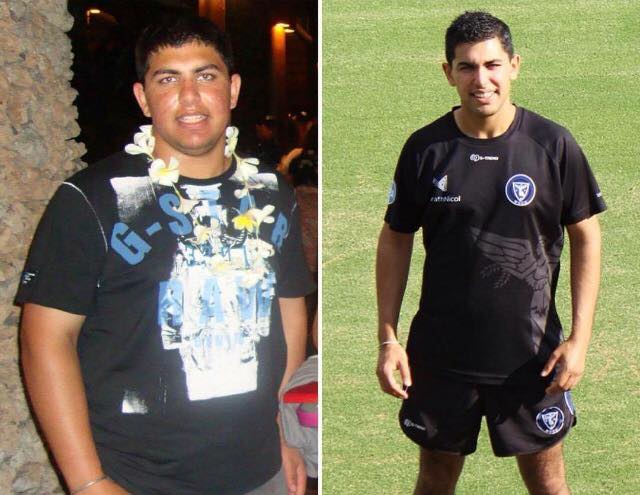
“The biggest shift I made initially was understanding how our environment influences our eating decisions.
So I guess it was the minor changes that added up rather than being a single major change. For example:
- Eating on the dinner table without distractions
- Taking a different route to work with minimal fast food options
- Getting into personal development and reading self help books
- Getting interested in spirituality
- Joining a district sports club.
Later on, I got more informed and qualified in nutrition to make the final few changes needed for fine tuning.”
Joe’s Comment
For Kern it wasn’t just about changing food habits, but changing habits in a variety of areas in his life.
Eating healthier became so fascinating for him that he learned even more to be able to teach others.
Sustainable weight loss is about lifestyle change.
Liz – Lost 30 lbs (14 kg) and kept it off for two years so far
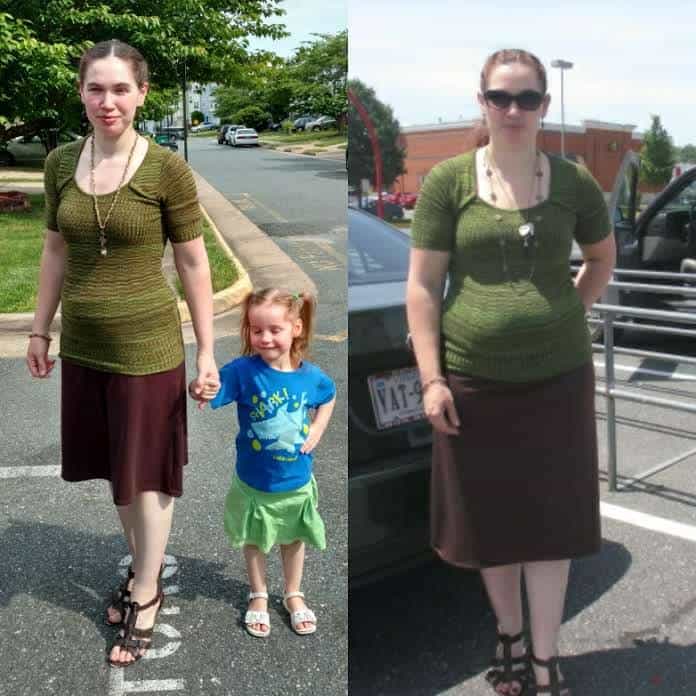
“In fact, I’ve lost 40 lbs right now but that’s recently so I don’t quite count it as “kept it off” just yet.
Really thinking about what I am eating helped, and working out every day no matter what, 20-60 minutes. I’m over 900 days in a row now.
Early in my weight loss journey a big change was cutting back how much sweet tea and coffee I was drinking- I only had one every other day for a while.
I’m back to multiple a day now but careful how much sugar in each. Working on spreading out and decreasing again but high stress makes that harder.”
What helped you stay motivated?
“I was tired of so many false starts.
I would start a week saying I would work out 5 days that week… 4 days… 3 days… I could not stay consistent and dedicated.
When I told myself I could not have a rest day if I wanted real change, my stubbornness finally did something good for me. My husband also gave me a light hearted challenge and I had to prove I could do it.
Additionally I get cranky if I don’t get my workout done first thing in the morning. Knowing my workout is already done makes the rest of the day smoother because I know I’ve already done one of the hardest things on my list for that day.”
Joe’s Comment
Liz’s amazing exercise record aside (I love that she knows the exact number of days in a row), what stood out for me was her husband providing accountability.
Studies consistently show we’re more likely to maintain new healthy habits when we’re kept accountable. Especially if you are competitive by nature, so use it to your advantage (3).
Social support is also extremely effective. Whether that comes in the form of a training buddy, a supportive family member, or an online community (such as a Facebook group)
“Knowing my workout is already done makes the rest of the day smoother because I know I’ve already done one of the hardest things on my list for that day.”
Nate – Down by almost 300 lbs (136 kg) now
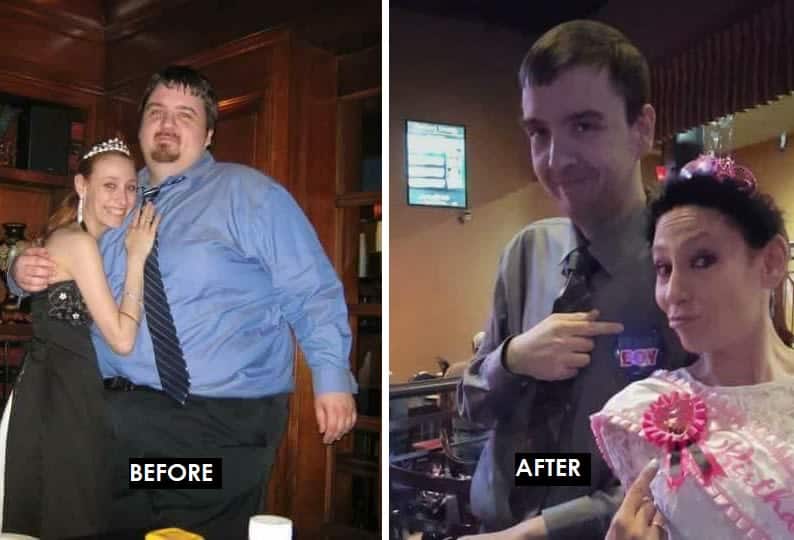
“I had pretty much tried just about every diet with no lasting success before I decided to get bariatric surgery.
It was the only thing that was able to help me keep the weight off.
Happy to say I’m down by almost 300 Lbs now. I was 472 lbs at my highest weigh-in, now five years later I hover around 180-185 lbs.”
Is your appetite a fraction of what it used to be, or just physically now you can’t eat that much food?
“I would say it’s both.
I can’t physically eat as much because my stomach is much smaller. But I simply don’t want to eat like I used to, due to the fact that eating too much, or eating what were once very enjoyable foods now makes me so uncomfortable.
Where once food was a major source of comfort, now if I’m not very careful it’s a source of pain or other side-effects like bloating or gastro. That’s changed the way I look at food ingredients and portion sizes completely.”
Joe’s Comment
Bariatric surgery is not uncommon.
And in certain circumstances it can be truly life-changing, which is why I wanted to include Nate’s story.
There is no right or wrong way to lose weight. You have to try several options and see what feels right for you.
Cheryl – Lost 160 lbs (73 kg) and counting
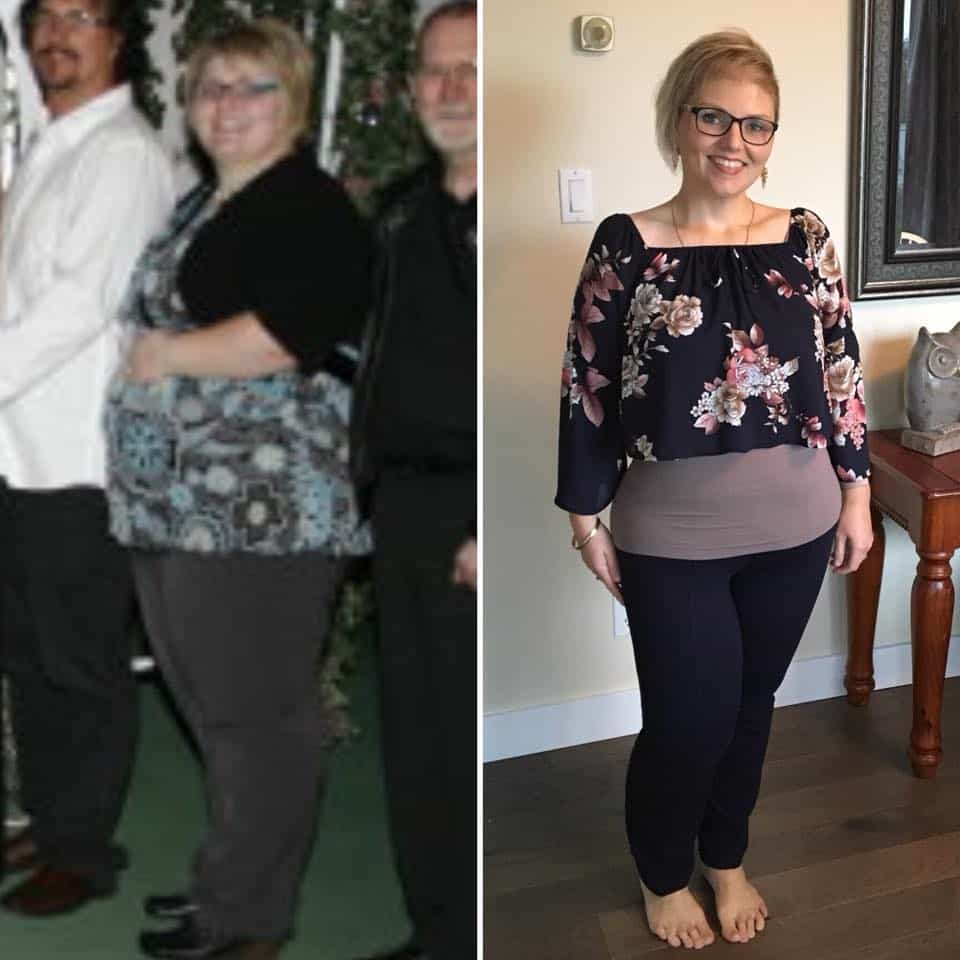
“I gave up quitting.
I was so determined that reaching my goal was finally going to happen that I was willing to commit for life and make any change necessary.
With 10 months to decide if I was going to have bariatric surgery, I gave it my all to see what I could accomplish without it.
I lost 100 lbs and decided to have the surgery anyways to help lose the next 100 lbs and maintain it long-term.”
What helped with weight loss before surgery?
“I stopped eating meat.
It’s calorie dense and nutritionally low. I’ve since transitioned to vegan after learning more about dairy.”
Joe’s Comment
Bariatric surgery was a success for Cheryl as it was with Nate.
But in order for it to be successful long-term you must prove you can lose weight beforehand on your own.
Cutting out meat was the most effective strategy for her, but certainly not the only option.
Jenna – Lost 27 lbs (12 kgs) for over 3 years now

“For me it was a change of mindset, learning what nutrition is and how to utilize the knowledge.
And this was a gradual change over time.
I thought to myself instead of trying to cut things out and restrict myself, rather take the attitude of what can I add to my daily habits– food, thoughts, and exercise to make it great!
I also learnt it’s about balance. If you want a taste of that birthday cake, have a taste, but go for a walk after and drink a green juice or some water so it then becomes beneficial for you.
I found that when I was too extreme either way, nothing worked and I still had health issues.
Additionally, I have a love for the natural world as well so learning about and adding medicinal plants into my diet really helped me too.”
“I thought to myself instead of trying to cut things out and restrict myself, rather take the attitude of what can I add to my daily habits…”
You Can Do It Too
I hope you find some inspiration from the advice and before and after photos, whether for yourself or a loved one.
To recap the most important points:
- Track your calorie intake for a week or so with a food diary or app like MyFitnessPal. Especially if you have no clue how many calories you eat in a day.
- There is no right or wrong diet or method to lose weight. Some prefer to cut out carbs, some meat, others just focus on total portions. Try and discover what works for you. The same goes for exercise.
- You may even benefit from ditching the self-restriction mentality altogether and instead take the attitude of what can I add to my daily habits?
- Don’t keep doing something if you hate it. It will drain your willpower and won’t stick.
- Read and learn more about nutrition (like you are doing right now) and try to cook more often. Don’t allow yourself to be disconnected from your food.
- Frame this journey as what you do for long term health rather than what you do for weight loss.
- Perhaps most importantly, be kind to yourself. Forgive yourself if you slip up or make a mistake, we are only human.
